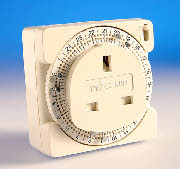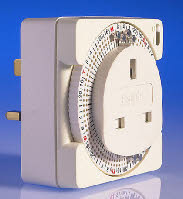

7-DAY TIMERS
Timers are a good way of switching off appliances when they are not required. For example, electric heaters in an office could be set to switch on only between 8 AM and 6PM, preventing them being left on all night. If a water heater is in use to boil water for tea and coffee, these too could be operated from a timer.
Simple plug-in timers, such as the shown below, are readily available.
If the organisation only operates Monday to Friday then a 7-day timer, like the one shown below should be used. This will ensure that appliances are not needlessly left on over the weekend.
Timers can also be used for extraction fans, lights and other appliances that are wired in.
CASE STUDY
How an office saved £143 every year by using a simple 7-day mechanical timer costing just £15.00
An office with 20 staff used a water boiler for making teas and coffees throughout the day. The average power consumption of the boiler was 1 kW and by providing hot water on tap it saved on time waiting for kettles to boil.
The normal practice was for the first person into the building to switch it on and the last person out to switch it off. However on average once a week it was left on overnight and once a month it was left on over the weekend.
The 7-day timer switch was set so that the water boiler only came on from Monday through to Friday. It was set to switch on at 8 AM and off at 6 PM as usually there was no one in before 8AM and the office was empty by 6PM. If staff worked outside these hours or were in at the weekend, they simply boiled a kettle to make a drink.
Annual savings due to appliance not being on overnight was 16 (hours) x 52 (once a week for a year) x 1 (kW) x 0.09p (cost per kWh) = £74
Annual savings due to appliance not being on over the weekend was 64 (hours) x 12 (once a month) x 1 (kW) x 0.09 (cost per kWh) = £69
Total savings by using a timer was £143.
(A similar example when using a 2 kW heater for a warehouse would yield a yearly saving of £286.)














